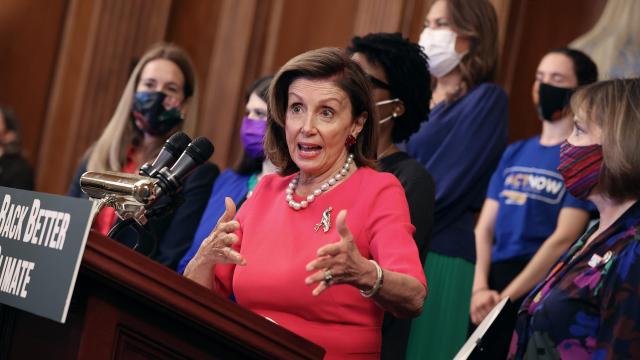The House of Representatives just narrowly passed a more than $US2 (A$2.76) trillion spending package that will include the first true climate change legislation passed since 2009.
The Build Back Better Act, which still awaits a vote in the Senate, allocates more than $US550 (A$759) billion to initiatives to combat climate change and spur investment in cleaner sources of energy. That includes around $US320 (A$442) billion in expanded tax credits for renewable energies and electric vehicles, $US105 ($145) billion towards bolstering climate change resilience, and $US110 (A$151) billion to improve U.S. renewable energy technology supply chains.
The bill passed the house on a party-line vote of 220-213, with one Democrat, Rep. Jared Golden of Maine, joining the Republican opposition.
Efforts to address climate change are a big part of what’s in the package, though they’re not the only thing. The remainder of the $US2 (A$2.76) trillion will also go towards updating federal health care, improving education, expanding new child tax credits, and a plethora of other social expenditures aimed at improving overall well-being.
Now for the bad news. While the hefty spending initiatives and transformative ethos behind the bill are a step in the right direction, the $US550 (A$759) billion is still far from enough to adequately address climate change.
And though the House bill’s passage — which was the source of intra-party bickering — moves the ball forward, the proposed legislation will face sturdy opposition in the Senate, particularly from West Virginia senator and unabashed obstructionist Joe Manchin. Manchin has already derailed two of the most significant climate provisions under consideration and last week came out against EV tax credits for union-made vehicles.
“We’d be lying if we said the Build Back Better Act passing the House was not a historic moment for climate action, but it means nothing if the Senate does not pass it,” Varshini Prakash, Sunrise Movement’s executive director, said in a statement. “The Senate better pass the damn bill. “
The last major climate legislation passed in the House was 2009’s American Clean Energy and Security Act, better known by its two sponsors Waxman-Markey. That bill would’ve created a carbon market for U.S. polluters, but it stalled out in the Senate when Democrats couldn’t come up with the votes to pass it. Since then, Democrats have been loathe to bring climate legislation to the floor even as the damage from an overheating planet worsens.
The Green New Deal, a proposal championed in the House by Rep. Alexandria Ocasio-Cortez, changed the maths, though. AOC introduced a resolution for the Green New Deal, and her and fellow progressives have followed with a handful of bills that would allocate money to its priorities. The popularity of the Green New Deal coupled with an increasingly potent climate movement has paved the way for the Build Back Better Act to get the floor vote it got on Friday. Now, it’s a question of if that pressure will be enough to push it through the Senate and onto President Joe Biden’s desk.
